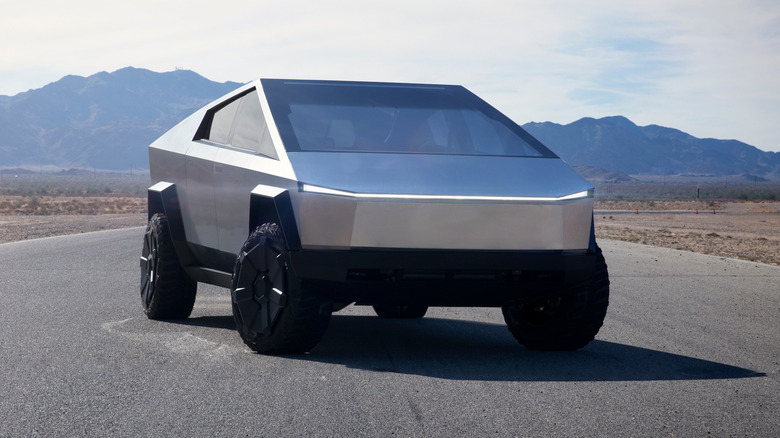Tesla Sets Strict Cybertruck Resale Rules On Earliest Buyers
Tesla's Cybertruck is easily one of the most hotly anticipated electric vehicles on the market, but if you try to flip it for a fat profit, you could end up in court with a lawsuit worth $50,000 in your name. The Elon Musk-led company is expected to begin Cybertruck deliveries later this month, but the lucky few who get their hands on the truck will have to abide by stringent resale terms. By stringent, we mean strictly no resale in the first year after the purchase date.
The carmaker already has certain resale rules, but special terms are in place exclusively for the Cybertruck. Aside from prohibiting owners from selling (or even attempting a sale) within the first year of ownership, Tesa only allows a direct buyback by the company itself. But that comes with a handful of caveats. First, the reason cited for resale "warrants an exception to its no reseller policy," says the company. But even after agreeing to it, the company requires advanced communication and a written undertaking by the customer.
It's no secret that Tesla's electric cars are a hot favorite for flippers. Due to the supply crisis and long waiting periods, used Tesla cars have repeatedly gone for a higher quote than their sticker price in the not-too-distant past. In 2023, Kelley Blue Book bestowed the Model S and X with the "Best Resale Value" award. The hype around the Cybertruck won't make the situation any easier.
A high penalty
Even if Tesla agrees to a buyback, it will make large deductions on the sticker price. Depending on the wear and tear situation, an estimated repair cost, and, most importantly, a fee of $0.25 per mile driven, Tesla will trim the final buyback offer accordingly. Only after Tesla declines a buyback offer can a Cybertruck owner take matters into their own hands and flip the car to a dealer or another interested buyer.
Any attempt to violate the standard Motor Vehicle Order Agreement Terms & Conditions could cost a buyer more than the car's value. Tesla will first try to block the transfer ownership legally, but if that's not an option, more drastic measures will follow. The company says it can " demand liquidated damages from you in the amount of $50,000 or the value received as consideration for the sale or transfer, whichever is greater."
But that's not the final hit. Tesla says once a customer breaches the Cybertruck resale policies, the company might refuse to sell Tesla cars to that customer in the future. Given the deeply software-linked nature of Tesla cars, any shady ownership transfer will definitely attract Tesla's attention, and it could very well block it, leaving both parties involved in an illicit exchange hanging dry. Tesla has raked in over a million registrations for the Cybertruck, and going by its production scaling plans, the waiting period could extend well into 2025 for a lot of interested parties.
Not an original ploy
Tesla has made it clear that the Cybertruck will be available in limited quantities, especially in the face of high demand, which makes sense that it would want to block resales. But it won't be the first brand to put in place such a policy, which is still legally contentious. Ferrari also has similar rules and doesn't shy away from banning celebrities for violating its ownership code of conduct.
Ford also grabbed eyeballs when it went after actor and WWE star John Cena for selling his limited-run Ford GT and sued the dealership involved in the sale. Mercedes also threatened a lawsuit for buyers of the nearly $3 million Mercedes-AMG Project One sports car. Aston Martin CEO Andy Palmer posted on X in 2017 that a person trying to flip their Valkyrie hypercar would lose the reservation. "If they flip, then they never get another special," he added.
For the 2024-bound limited edition 911 S/T, of which Porsche is making less than two thousand units, the company will technically lease it to buyers for a full calendar year as a push for retention and to discourage reselling. With exotic sports cars, it's not just money that guarantees a purchase, especially in the case of limited-run models. Brands are extremely picky at selecting a buyer in hopes that they would act as an appropriate brand ambassador for their rides and that a deserving person gets it instead of a scalper looking for quick money.

